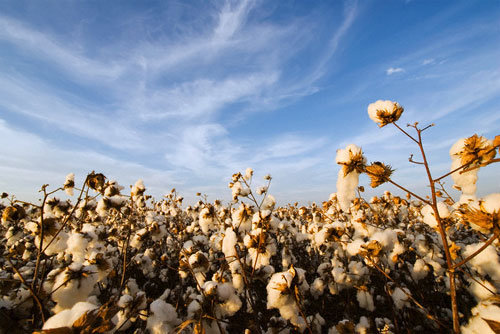By
Reuters
Reuters
Published
Feb 17, 2010
Feb 17, 2010
Government not to curb cotton exports despite price rise
By
Reuters
Reuters
Published
Feb 17, 2010
Feb 17, 2010
By Sourav Mishra & Rajendra Jadhav
MUMBAI (Reuters) – The government will not curb exports of cotton despite a surge in domestic prices that has undermined margins of textile makers still recovering from the financial crisis, a senior government official said.
 |
"There is no plan to curb exports," A B Joshi, textile commissioner and chairman of Cotton Advisory Board (CAB) told Reuters in a written reply late on Tuesday 16 February.
Textile trade groups have been demanding restrictions on cotton exports since the beginning of the year in October. The four months since have seen cotton exports more than treble.
The world's second biggest producer exported 2.79 million bales of 170 kg each in the first four months, up 245 percent compared to the corresponding period a year ago.
"Major cotton importing countries for raw cotton in the cotton season 2009/10 are China, Bangladesh, Pakistan, Indonesia, Vietnam, Turkey, Taiwan and Vietnam," Joshi said.
The industry is expecting an active demand from neighbouring countries to continue during rest of the year.
Trade associations estimate annual exports of the fibre could hit 7 million bales, though Joshi maintained that India's annual export target of 5.5 million bales, set at the beginning of the season, has not yet been revised.
But industry officials, who are also members of CAB, expect the upward revision in the export target in the next CAB meeting, likely before the end of February.
Indian exports are driven by a recovery in global consumption led by major importer China, where mill consumption may rise 15 percent according to International Cotton Advisory Committee.
Current lint prices of different varieties are up 23-43 percent from last year, according to Cotton Corp of India. Large scale overseas demand has also hardened the average export price.
"Average export price of raw cotton in first four months (Oct-Jan) of 2009-10 is 69.46 rupees ($1.5) per kg compared to 68.45 rupees for the year ago period," he said.
U.S. cotton futures jumped more than 1 percent on Tuesday 16 February, hitting six-week highs, as a broad rally in commodities channelled buying interest into the fibre market, traders said.
India exported only 3.5 million bales in 2008/09, sharply lower than 8.5 million bales exported a year before, as the government increased support prices by 40 percent, affecting the country's lower price advantage, analysts and traders said.
The south Asian country is likely to harvest 30 million bales of cotton in 2009/10, up from 29 million bales produced last year.
(Editing by Harish Nambiar)
© Thomson Reuters 2024 All rights reserved.
























